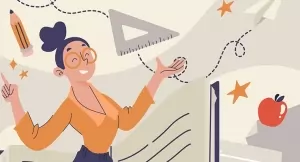Are you looking to get your first job in the Education industry? Or would you like to progress with your career as a Teaching Assistant? Then read on, this article might just solve your problems.
Although not every school may require qualifications for a teaching assistant, you need to show your commitment to developing knowledge and new skills to impress at the interview. Qualifications would also equip you with confidence and familiarity on school related topics. It will also help you progress further and receive a higher rate of pay. Our training partner offers level 4 (RQF) Teaching Assistant courses and – unlike many other TA qualifications in the market – these are accredited by OFQUAL and will be accepted throughout England. Online learning means that you can study, no matter whether you’re busy working, a parent with their hands full, or have time on your hands. It also saves time and energy as you don’t have to commute to a location, you can do it at home, at a cafe or wherever you like. Advanced technology and online learning is definitely opening new opportunities for anyone with motivation and willingness to develop.
Earn and study at the same time
TLTP Education will be here to help you find work whilst you are studying so that you can be earning and gaining valuable experience at the same time. We have specialist desks which means our Recruitment Consultants have in-depth knowledge of your job and are able to confidently find you your ideal role whilst providing the right support you need. You will have a dedicated consultant who will guide you through the registration and compliance processes and continue to look for work for you whilst you are studying and even after you have qualified.
View our latest Teaching Assistant roles and apply today.
If you decided to start your career as a Teaching Assistant or to progress in the Education sector, give Stonebridge Careers Training a call quoting 'TLTP Education' to discuss your situation on: 01202 497 980. You might even qualify for a 19+ Advanced Learning Loan, backed by the government.
10 reasons why teaching assistants are essential
Teaching Assistants play a critical role in helping educate pupils. Managing a class of 30 is a huge task for any Teacher and the responsibility covers a wide scope of activities. This is where the Teaching Assistant (TA) comes in.
Teaching Assistants helps to set up the classroom, mark papers, answer student questions, support students in accomplishing tasks and can even supplement course materials and lessons from time to time. A TA will help to manage student behaviour in a discreet manner without disrupting the whole class and allowing the focus remain on the Teacher to deliver effective teaching. TA’s also go one step further and build happy and valuable relationships with students, parents and other staff members at the school. They play an essential role and often are the unsung heroes!
Here are our ten reasons why we believe teaching assistants are essential and should always have a place in the classroom.
1. They offer one on one support
Many children are overwhelmed by packed classrooms and are unable to take things in, especially for those beginning primary school it can be quite daunting. Teaching assistants play a pivotal role in important one on one sessions and helping children overcome their anxieties.
2. They provide access for children
Previously many children with disabilities would not have been able to access education so easily as they can today without the help from specialists. Teaching assistants today are highly trained in supporting with mental and physical disabilities, speech and language issues, behavioural difficulties and a range of other conditions. It’s a tough job however very highly rewarding.
3. Extra set of eyes
An extra set of eyes is always handy and teachers don’t have eyes in the back of their heads!
4. They help your child find a Eureka breakthrough
Reading a tough word for the first time, reaching the end of a book or finally cracking a Maths problem, that excitement on a child’s face when they explode back into the house with a gold star could be thanks to the TA.
5. Reduces the pressure off of the teacher
A class full of thirty students all needing help during a difficult lesson is impossible ground to cover for one person. A teaching assistant will help ease the load off of the teacher allowing them to focus on what they do best – teaching. TAs can be utilised in situations for all students to reap the benefit.
6. Class control
Teaching assistants help to control the classroom by identifying on those difficult students or helping the teacher implement rules and taking the appropriate action where required.
7. Teaching assistants work together with the teacher to implement strategies
A teacher and their assistant can work together and identify a group of people that need some intervention. Whether it’s a group finding the work difficult and need a helping hand or a group needing a good push because they’re excelling, having someone to take them aside means that there’s less chance of a child being left behind or held back.
8. They’re friendly and approachable
Teachers have a position of power and authority and even though they can come across assertive they are in fact lovely, down to earth wonderful people. However due to their power they can be harder to approach, and many students find it easier to talks to the teaching assistant instead.
9. They do a lot behind the scenes
There’s for a teaching assistant. Many arrive very early and / or stay behind after school finishes to help plan lessons, prepare the classroom, monitor and report on progress as well diving into the daily tasks of school life.
10. They can also team teach
Interactive lessons are always a big hit especially when they are a bit different and are not just the same face lecturing them from the front of the room. Having seen teaching assistants and teachers join forces to deliver fun and exciting presentations, pieces of drama and even singing a song together, makes a difference in .
For many students the teaching assistant is more than just a face in the class. They are a big part of their life who can have a serious impact on their future.
3 cheers for Teaching Assistants!
Hip Hip Hooray! Hip Hip Hooray! Hip Hip Hooray!
We are recruiting for some fantastic Teaching Assistant roles n Primary, Secondary and SEN schools. Browse through our current vacancies and apply today.
Teaching the first world war
One hundred years ago, a hitherto individual by the name Gavrilo Princip, a member of Young Bosnia, set in motion a chain of events that would eventually lead to the outbreak of the first world war. It was utterly inconceivable to all that a regional conflict would take over the entire planet.
As the historian Hew Strachan concludes in his excellent history of the conflict, The First World War, the consequences of it were unfathomable, both immediate and in terms of legacy.
It would "break" the empires of Germany, Russia, Austria-Hungary and Turkey. It set in motion the Russian Revolution and, in turn, "provided the bedrock for the Soviet Union", it transformed the US' role in international politics and, for a while, "revivified" liberalism.
"On Europe's edge it provided a temporary but not a long-term solution to the ambitions of the Balkan nations," Mr Strachan explains.
"Outside Europe it laid the seeds for the conflict in the Middle East. In short it shaped not just Europe but the world in the twentieth century. It was emphatically not a war without meaning or purpose."
It remains, despite all the material published across all mediums – book, music, film, etc – a war that we are still trying to get to grips with, both in terms of its causes and its legacy. This task is continual for every generation that broaches the subject – and every generation that previously has – as, proximity influences our viewpoint.
History through all prisms
The obligation of every historian and history teacher then is to attempt to frame the discourse of the war in as objective way as possible, for every important moment in this disastrous clash of empires (and nations) to be taught through multiple prisms of thought.
Global scope
There are triggers, literal or otherwise, that hold truths about why the world went to war in 1914, but, by and large, there is no easy, universal answer. Look to the Guardian's global guide to the first world war for guidance, an interactive documentary that presents, courtesy of ten historian from ten countries, a brief and very diverse history of the war. It is a commendable effort, nuanced, and a very good introductory survey that will serve well throughout the study of the subject.
1914/2014
Needless to say, discussing the war against the backdrop of current events is essential. Conflicts this year in particular have seemed to echo, somewhat ironically, the very incidents of 1914, going to show that while technology and medicine may progress, when it comes to civilisation, humanity keeps going around in circles. A lot of new ideas can come from this.
Travel, embrace and see
Culturally speaking, at galleries and museums, the next four years are going to consistently deliver first world war themed exhibitions, shows and talks. Again, this is truly global in scale, meaning there will be plenty of opportunities for schools to deliver some of the best, most informative and immersive lessons on this subject. Some curatorial efforts are outstanding and one day-trip, for example, has the potential to transform a student's understanding.
The ubiquity of material
Likewise, though there has never been any shortage of first world war material, the one-hundred-year anniversary has nevertheless brought with it a renewed sense of scholarly vigour, and more so, operating as we do in a technologically-savvy and intuitive age, access to all sorts of media is easier and engaging. Again, endeavour to point to sources from a variety of sources.
Give it life
There are no absolute rules to teaching the first world war. An interest in the subject certainly helps, passion being a naturally captivating element that can enrich or best articulate something that might go over a student's head or present itself as being uninteresting.
They key is in the details. Make every lesson feel alive, abundant in resources, things to do and activities that provoke, challenge and intrigue your pupils. The material, the technology, the events, they are all there and information rich. What makes them standout is ultimately you and your ability to tap into them and present them in a captivating way. That's how you teach the first world war.










